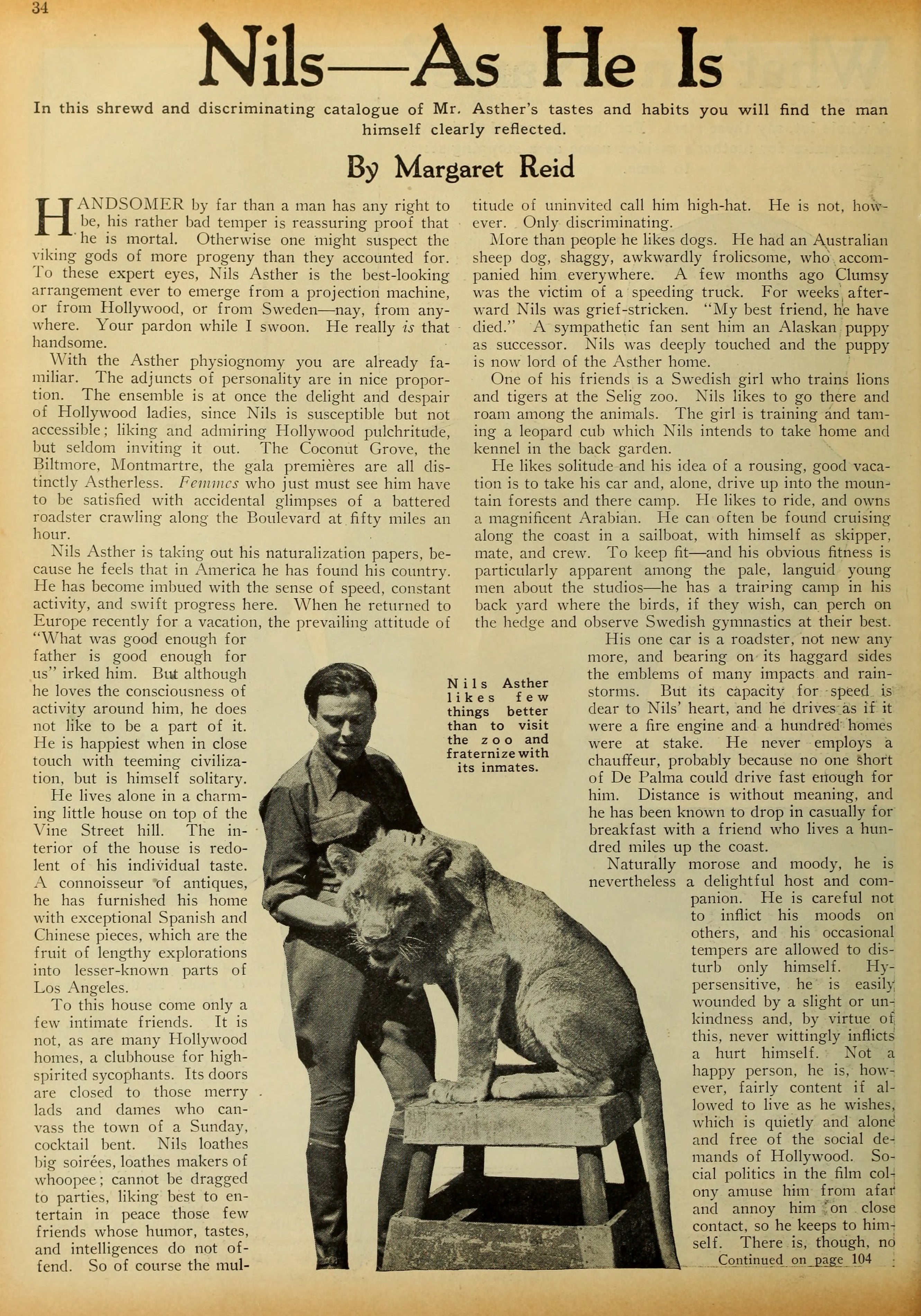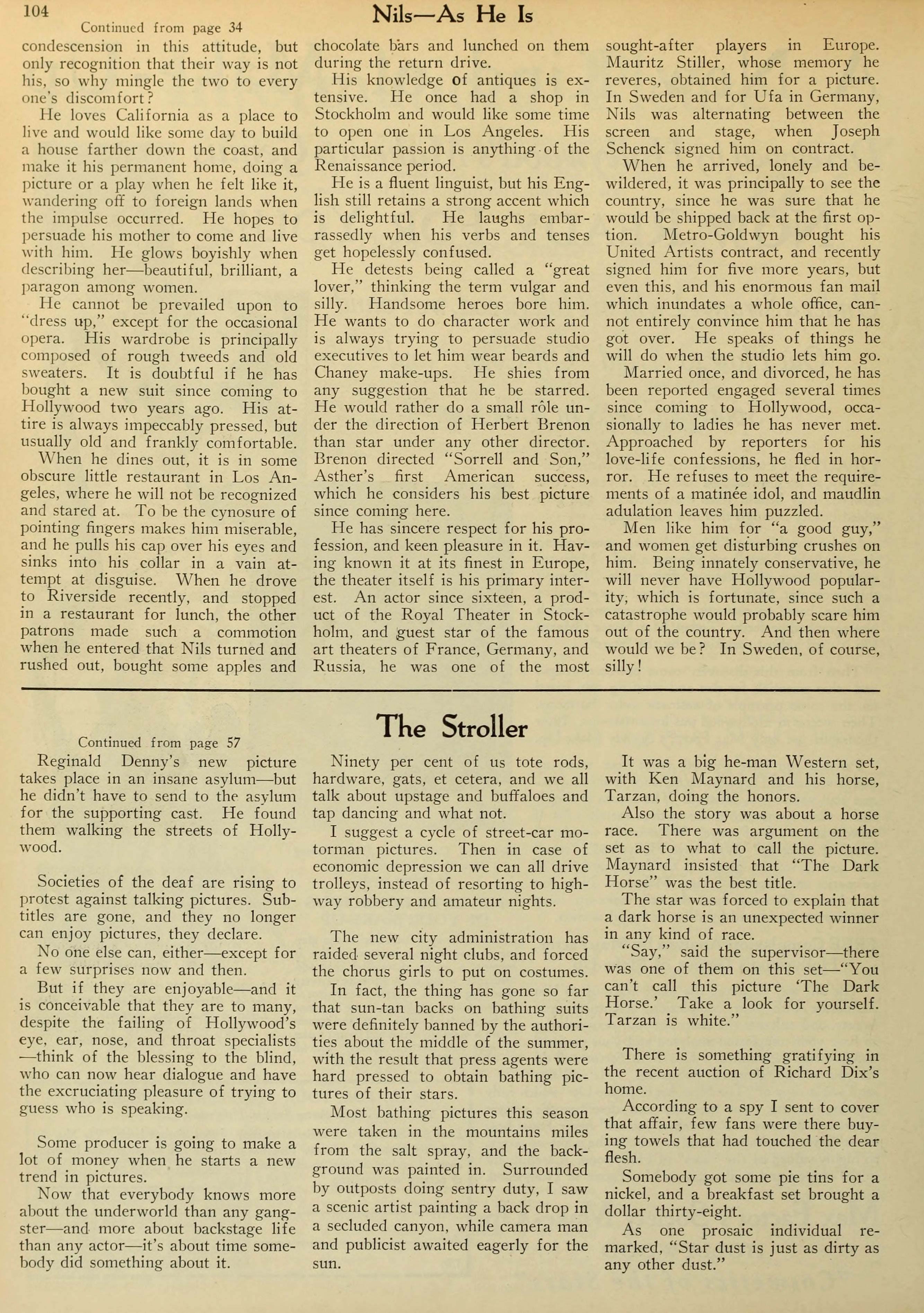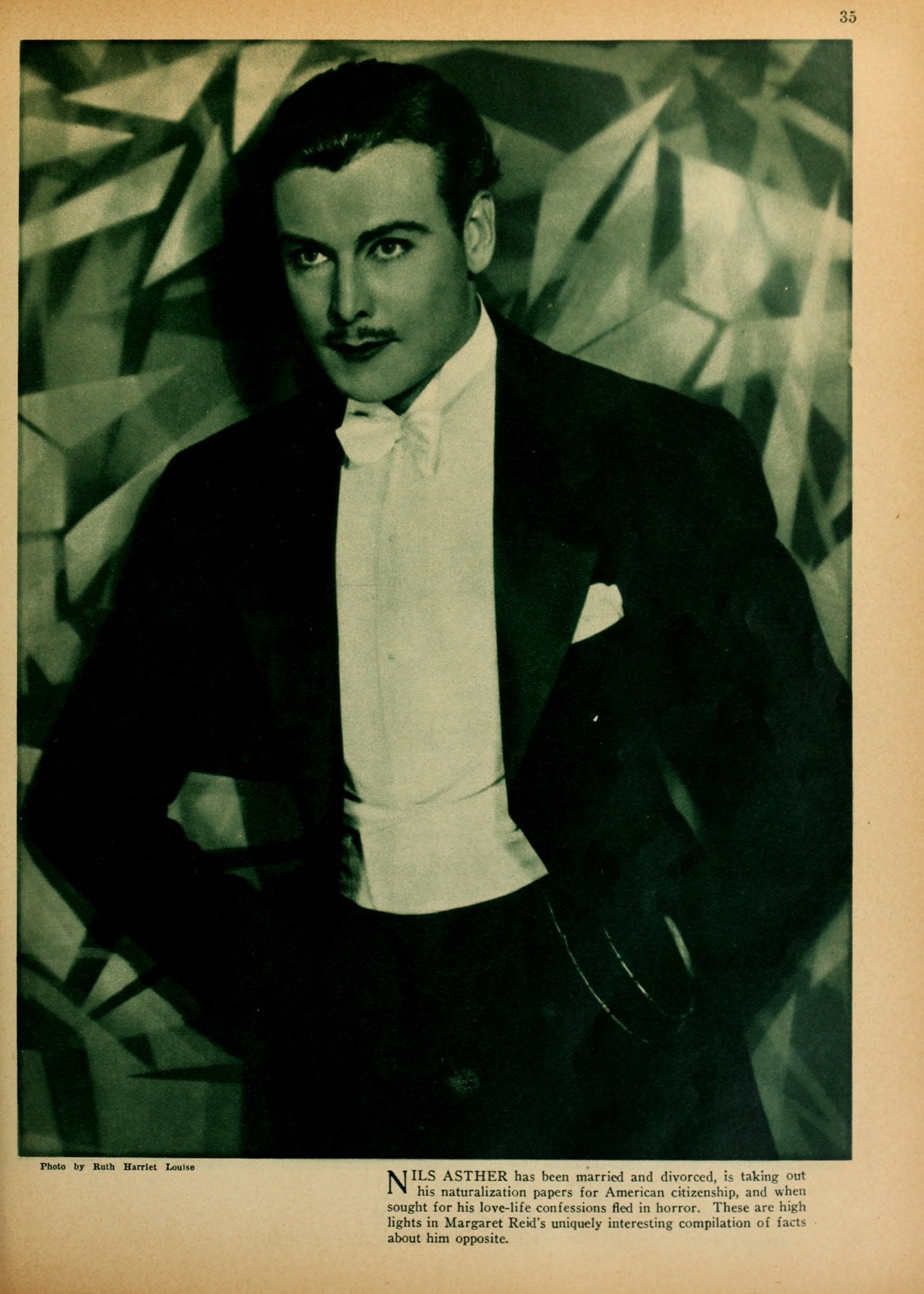Nils Asther — As He Is (1929) 🇺🇸

Handsomer by far than a man has any right to be, his rather bad temper is reassuring proof that he is mortal. Otherwise one might suspect the viking gods of more progeny than they accounted for. To these expert eyes, Nils Asther is the best-looking arrangement ever to emerge from a projection machine, or from Hollywood, or from Sweden — nay, from anywhere. Your pardon while I swoon. He really is that handsome.
With the Asther physiognomy you are already familiar. The adjuncts of personality are in nice proportion. The ensemble is at once the delight and despair of Hollywood ladies, since Nils is susceptible but not accessible; liking and admiring Hollywood pulchritude, but seldom inviting it out. The Coconut Grove, the Biltmore, Montmartre, the gala premieres are all distinctly Astherless. Femmes who just must see him have to be satisfied with accidental glimpses of a battered roadster crawling along the Boulevard at fifty miles an hour.
Nils Asther is taking out his naturalization papers, because he feels that in America he has found his country. He has become imbued with the sense of speed, constant activity, and swift progress here. When he returned to Europe recently for a vacation, the prevailing attitude of “What was good enough for father is good enough for us” irked him. But although he loves the consciousness of activity around him, he does not like to be a part of it. He is happiest when in close touch with teeming civilization, but is himself solitary.
He lives alone in a charming little house on top of the Vine Street hill. The interior of the house is redolent of his individual taste. A connoisseur of antiques, he has furnished his home with exceptional Spanish and Chinese pieces, which are the fruit of lengthy explorations into lesser-known parts of Los Angeles.
To this house come only a few intimate friends. It is not, as are many Hollywood homes, a clubhouse for high-spirited sycophants. Its doors are closed to those merry lads and dames who canvass the town of a Sunday, cocktail bent. Nils loathes big soirees, loathes makers of whoopee; cannot be dragged to parties, liking best to entertain in peace those few friends whose humor, tastes, and intelligences do not offend. So of course the multitude of uninvited call him high-hat. He is not, however. Only discriminating.
More than people he likes dogs. He had an Australian sheep dog, shaggy, awkwardly frolicsome, who accompanied him everywhere. A few months ago Clumsy was the victim of a speeding truck. For weeks’, afterward Nils was grief-stricken. “My best friend, he have died.” A sympathetic fan sent him an Alaskan puppy as successor. Nils was deeply touched and the puppy is now lord of the Asther home.
One of his friends is a Swedish girl who trains lions and tigers at the Selig zoo. Nils likes to go there and roam among the animals. The girl is training and taming a leopard cub which Nils intends to take home and kennel in the back garden.
He likes solitude and his idea of a rousing, good vacation is to take his car and, alone, drive up into the mountain forests and there camp. He likes to ride, and owns a magnificent Arabian. He can often be found cruising along the coast in a sailboat, with himself as skipper, mate, and crew. To keep fit — and his obvious fitness is particularly apparent among the pale, languid young men about the studios — he has a training camp in his back yard where the birds, if they wish, can perch on the hedge and observe Swedish gymnastics at their best. His one car is a roadster, not new any more, and bearing on its haggard sides the emblems of many impacts and rainstorms. But its capacity for speed is dear to Nils’ heart, and he drives as if it were a fire engine and a hundred homes were at stake. He never employs a chauffeur, probably because no one short of De Palma could drive fast enough for him. Distance is without meaning, and he has been known to drop in casually for breakfast with a friend who lives a hundred miles up the coast.
Naturally morose and moody, he is nevertheless a delightful host and companion. He is careful not to inflict his moods on others, and his occasional tempers are allowed to disturb only himself. Hypersensitive, he is easily wounded by a slight or unkindness and, by virtue of this, never wittingly inflicts a hurt himself. Not a happy person, he is, however, fairly content if allowed to live as he wishes, which is quietly and alone and free of the social demands of Hollywood. Social politics in the film colony amuse him from afar and annoy him on close contact, so he keeps to himself. There is, though, no condescension in this attitude, but only recognition that their way is not his, so why mingle the two to every one’s discomfort?
He loves California as a place to live and would like some day to build a house farther down the coast, and make it his permanent home, doing a picture or a play when he felt like it, wandering off to foreign lands when the impulse occurred. He hopes to persuade his mother to come and live with him. He glows boyishly when describing her — beautiful, brilliant, a paragon among women.
He cannot be prevailed upon to “dress up,” except for the occasional opera. His wardrobe is principally composed of rough tweeds and old sweaters. It is doubtful if he has bought a new suit since coming to Hollywood two years ago. His attire is always impeccably pressed, but usually old and frankly comfortable.
When he dines out, it is in some obscure little restaurant in Los Angeles, where he will not be recognized and stared at. To be the cynosure of pointing fingers makes him miserable, and he pulls his cap over his eyes and sinks into his collar in a vain attempt at disguise. When he drove to Riverside recently, and stopped in a restaurant for lunch, the other patrons made such a commotion when he entered that Nils turned and rushed out, bought some apples and chocolate bars and lunched on them during the return drive.
His knowledge of antiques is extensive. He once had a shop in Stockholm and would like some time to open one in Los Angeles. His particular passion is anything of the Renaissance period.
He is a fluent linguist, but his English still retains a strong accent which is delightful. He laughs embarrassedly when his verbs and tenses get hopelessly confused.
He detests being called a “great lover,” thinking the term vulgar and silly. Handsome heroes bore him. He wants to do character work and is always trying to persuade studio executives to let him wear beards and Chaney make-ups. He shies from any suggestion that he be starred. He would rather do a small role under the direction of Herbert Brenon than star under any other director. Brenon directed Sorrell and Son, Asther’s first American success, which he considers his best picture since coming here.
He has sincere respect for his profession, and keen pleasure in it. Having known it at its finest in Europe, the theater itself is his primary interest. An actor since sixteen, a product of the Royal Theater in Stockholm, and guest star of the famous art theaters of France, Germany, and Russia, he was one of the most sought-after players in Europe. Mauritz Stiller, whose memory he reveres, obtained him for a picture. In Sweden and for Ufa in Germany, Nils was alternating between the screen and stage, when Joseph Schenck [Joseph M. Schenck] signed him on contract.
When he arrived, lonely and bewildered, it was principally to see the country, since he was sure that he would be shipped back at the first option. Metro-Goldwyn bought his United Artists contract, and recently signed him for five more years, but even this, and his enormous fan mail which inundates a whole office, cannot entirely convince him that he has got over. He speaks of things he will do when the studio lets him go.
Married once, and divorced, he has been reported engaged several times since coming to Hollywood, occasionally to ladies he has never met. Approached by reporters for his love-life confessions, he fled in horror. He refuses to meet the requirements of a matinee idol, and maudlin adulation leaves him puzzled.
Men like him for “a good guy,” and women get disturbing crushes on him. Being innately conservative, he will never have Hollywood popularity, which is fortunate, since such a catastrophe would probably scare him out of the country. And then where would we be? In Sweden, of course, silly!

Nils Asther likes few things better than to visit the zoo and fraternize with its inmates.


Nils Asther has been married and divorced, is taking out his naturalization papers for American citizenship, and when sought for his love-life confessions fled in horror. These are high lights in Margaret Reid’s uniquely interesting compilation of facts about him opposite.
Photo by: Ruth Harriet Louise (1903–1940)
Collection: Picture Play Magazine, August 1929
